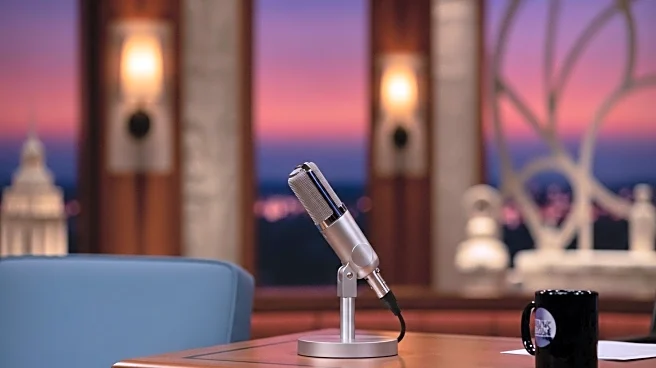What's Happening?
Jimmy Kimmel's late-night show is set to return to ABC stations across the United States after Nexstar and Sinclair decided to end their suspension of the program. The suspension was initially triggered by comments Kimmel made regarding Charlie Kirk's killer, which led to a temporary blackout by the two station groups. Disney, the parent company of ABC, had suspended the show to avoid further inflaming tensions during a sensitive period. Despite the blackout, the show achieved record ratings upon its return. Disney did not make any editorial concessions to the station groups in resolving the issue. Nexstar and Sinclair's decision to resume airing the show is seen as a victory for Disney and ABC, which faced criticism for allegedly succumbing to pressure from the Trump administration.
Why It's Important?
The return of 'Jimmy Kimmel Live!' is significant as it highlights the ongoing tensions between media companies and political entities regarding content and free speech. The suspension and subsequent return of the show underscore the challenges media companies face in balancing editorial decisions with public and political pressures. Disney's handling of the situation reflects the complexities of maintaining First Amendment rights while addressing community sensibilities. The controversy also illustrates the influence of political figures on media operations, as seen in FCC chairman Brendan Carr's threats to pursue complaints against ABC stations. The resolution of this issue may set a precedent for how media companies navigate similar situations in the future.
What's Next?
With the show back on air, stakeholders will likely monitor the public and political reactions closely. Nexstar and Sinclair's decision to resume airing the show may lead to further discussions about the role of media in political discourse and the responsibilities of broadcasters in maintaining unbiased content. Disney and ABC may continue to face scrutiny from both political entities and consumer groups, potentially influencing future programming decisions. The situation may also prompt broader conversations about the limits of free speech in media and the responsibilities of broadcasters in reflecting community values.
Beyond the Headlines
The controversy surrounding Jimmy Kimmel's show raises deeper questions about the ethical responsibilities of media companies in handling sensitive content. It highlights the potential conflicts between commercial interests and editorial integrity, especially when political pressures are involved. The situation also brings attention to the role of media in shaping public discourse and the importance of protecting free speech while considering community standards. As media companies navigate these challenges, they may need to reassess their strategies for addressing controversial content and maintaining public trust.









